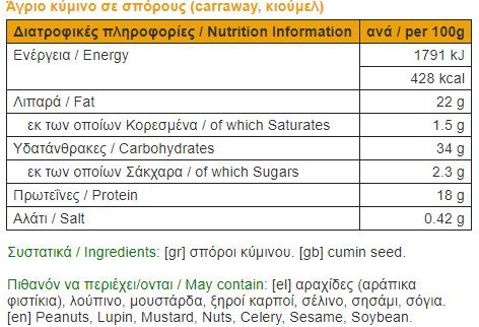FREE SHIPPING & DISCOUNTS
Free shipping on orders over 90 euros, enjoy 5% discount on orders over 40 euros. Get an additional 3% off on orders over 60 euros
shipping & paymentsCaraway seed is one of the dominant spices in the traditional Europian cuisine, featuring in several savory dishes. It is a biennial, herbaceous plant and a member of the parsley family; a large family of plants and herbs that also includes commonly known herbs and spices such as dill, anise, fennel, cumin etc. The Carum Carvi plant, as it is sienctifically called, is native to western Asia, Europe and North Africa.
Caraway seeds, having similarities in appearance as that of cumin, are crescent in shape, dark brown, with up to five ribs running lengthwise on their surface. The fruit is generally harvested during the early hours of the day to avoid spilling of the fruits in the fields. They are then staked in bundles and left to dry under sunlight.
Tastewise, caraway is slightly bitter, pungent and bears similarities to anise due to its essential oils. It doesn't hold any fragrance at first, but when squeezed between one's fingers, it unleashes a warm, sweet, peppery aroma.
Traditionally, Hippocrates used the seed to maintain good form and health. Dioskourides used it for nasal congestion, toothache, headache and intestinal parasites. Queen Cleopatra added caraway seeds to her baths and the Egyptians utilized its medicinal properties to soothe coughing. The Jews use caraway in bread recipies and Muhammad described caraway seeds as a panacea.
Cawarway seeds are extensively used in European and Mediterranean cooking. In order to keep the fragrance and flavor intact, caraway seeds are generally roasted gently under light heat and ground just before using them in a recipe. The seeds are widely employed as a savory spice. They are principally added in cooking as a condimend and flavoring base. They are featured in dishes like cabbage soups, sauerkraut, pickles and salads. It gives a very pleasant aroma in breads, cakes, biscuits and cheese. Alongside other spicy condiments, they are used to season sausage and other meat preparations.
Medicinal Applications:
Safety Profile:
Caraway, just as other fellow spices, should be used in small amounts. Too much spices in the food can cause gastrointestinal irritation, and stomach ulcers.
We inform you that we are not doctors but traders. What is written in our online store has a simple informative character and in no way replaces medical science. Always consult your doctor about your health issues.


Free shipping on orders over 90 euros, enjoy 5% discount on orders over 40 euros. Get an additional 3% off on orders over 60 euros
shipping & payments